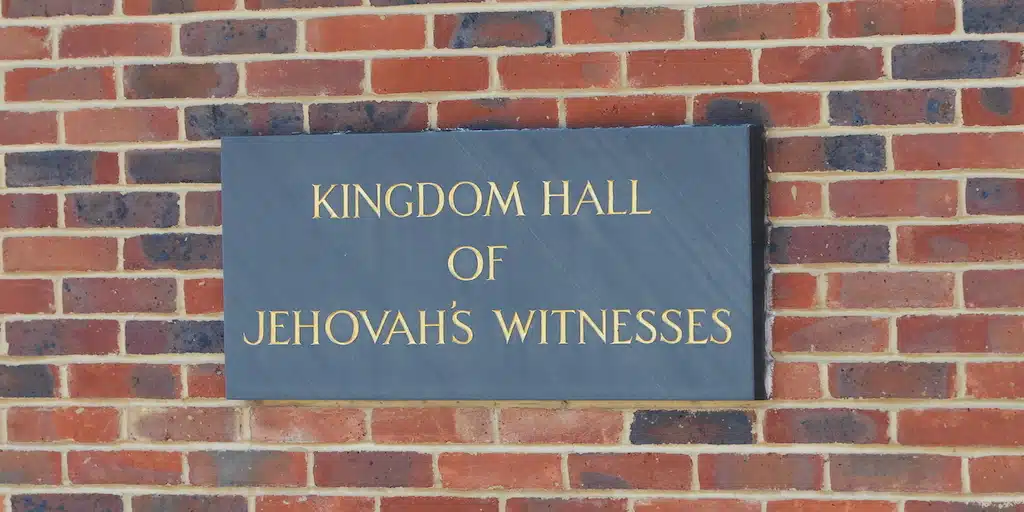Jehovah’s Witnesses and the Doctrine of Hell
| By: Lorri MacGregor; ©July 2001 |
| Many unbelievers ask, “Why would a loving God send anybody to an eternal hell?” Is the concept of an eternal hell contrary to God’s nature? Lorri MacGregor explains the meaning of three words, all of which are translated “hell” in our English Bible. |
The subject of “Hell” is usually a hot one. The late “Pastor” Charles Taze Russell, founder of the Jehovah’s Witnesses, delighted in attacking this Bible teaching in public talks, ridiculing the notion of God tormenting people in hell. “Why would a loving God do this?” he would shout. Other cult groups at this time jumped on the bandwagon and denounced hell as well. “Soul sleep” became popular, where the dead one would be unconscious or asleep until the resurrection. Unsaved ones were simply destroyed/annihilated with no eternal consequences for the wicked.
What is the truth of the matter concerning the subject of hell? We need to let the Bible be our guide.
Three Words for “Hell”
Most of the confusion surrounding the topic of hell, is because the King James Version of the Bible translated three distinct Greek words by the one word “hell.” The three Greek words are, “tartaros,” “hades” and “gehenna.” Only one of these three words refers to the place of eternal torment commonly called “hell,” and the other words are often given mistaken meanings. Let’s consider these three words and their meanings.
Tartaros
“Tartaros” need not concern us too much since this is a special abode for angels who are confined to this special pit of darkness. The word “tartaros” occurs only once in the New Testament, in 2 Peter 2:4.
Hades
“Hades,” also translated “hell,” occurs ten times in the New Testament, and is referred to by three writers, Matthew, Luke, and John.
The most detailed information we can find out about Hades is in Luke, Chapter 16, where we are told about a rich man and Lazarus. Lazarus died in a righteous condition and the angels took him into Abraham’s bosom, to a place of peace and security. The rich man, on the other hand, went to “hades” or “hell,” and was in great torment. He was obviously fully conscious of his surroundings, and not in a condition of “soul sleep,” for the account in Luke records, “…The rich man also died and was buried, and in hell [or hades], he lifted up his eyes, being in torment… “ [Luke 16:22, 23].
He pleaded for a drop of water to cool his tongue because of the torment of the flame. He could see the happy condition of Lazarus, but he could not leave his place of torment. He spoke about his worry over the condition of his five brothers who had yet to die. He wished to spare them his present agony. Yet this pitiful rich man had all his faculties, and was indeed experiencing ongoing torment.
Could Luke 16 be “only a Parable”?
Groups like the Jehovah’s Witnesses and others denying the reality of hellfire do indeed claim that the above account is only a parable, or is “figurative” or “spiritual.” However this account is not a parable, since proper names of recognizable Bible characters are used, whereas Jesus never used proper names in his parables, and generally indicated when he was teaching a parable.
Even stretching the point, and allowing that it could be a parable, it teaches an important truth, and Jesus taught truth, not falsehoods.
Hades is not the Final Destination
“Hades” in Greek, finds its parallel in the Hebrew word “Sheol.” “Hades” and “Sheol” [both translated “hell”] are often called the “holding tanks” by some Bible scholars, since souls in this “hell” are not in their final destination. According to Revelation 20, those in Hades will yet stand before the Great White Throne Judgment. Hades will be terminated at this time. Those with condemnatory judgment will be cast into “gehenna” [hell], the Lake that burns with “Fire and Brimstone.”
“Hades” or “Sheol” does not mean only the grave as the cult groups teach. That is one meaning for these words, but other original words are used to mean the literal grave with its headstones or pit-marker. “Hades” or “Sheol” refers to the condition of the dead, as we considered in Luke 16. “Hades” will finally be done away with in God’s time, but “gehenna” will remain.
What did Jesus Say about Gehenna?
One has only to read the words of Jesus in Mark 9:42-44ff. to know the seriousness of a final destination of “gehenna”: “And whosoever shall offend one of these little ones that believe in Me, it is better for him that a millstone were hanged about his neck, and he were cast into the sea. And if thy hand offend thee, cut it off: it is better for thee to enter into life maimed, than having two hands to go into hell [or gehenna], into the fire that never shall be quenched where their worm dieth not, and the fire is not quenched.”
This same warning is issued regarding a foot or an eye that would hinder us, that “the fire would not be quenched,” and “the worm would not die.” Christ stresses that it would be better to lose the most precious things in this life and to avoid hell, than it would be to retain all that this life holds dear, and be cast into this dreadful place.
Cult groups like to think the fire would annihilate them or consume them, but God is capable of altering the properties of fire. Consider the burning bush of Moses’ day that was not consumed, and also the “fiery furnace” of Daniel’s day.
What about Soul Sleep?
A condition of “soul sleep” is obviously not taught by Christ. The inhabitants of hell are not unconscious or annihilated. When we really believe the word of God as it is written, and don’t try to “figuratize” or “spiritualize” it away as the cults do, it becomes evident that Hell is a very real place of destination, and it’s inhabitants are conscious. The Bible makes this very clear.
Let’s compare Revelation 19:20, with 20:10. Before the 1,000 year reign of Christ, the beast and the false prophet were cast into the lake of fire. Were they annihilated as the cults teach? No, for 1,000 years later, they are still alive, and the Devil joins them in their condition of torment. Scripture says they; “…shall be tormented day and night, forever and ever” [Revelation 20:10].
Let’s Believe Jesus
Let’s just believe the words of Jesus Christ in Matthew 25:46, that there are two destinations, one for believers, and one for unbelievers: “And these shall go away into eternal punishment; but the righteous into eternal life.”
The same exact word in the Greek describes both conditions. Both are “everlasting,” “eternal” and “ongoing.” We may choose eternal life, or eternal punishment and torment. Denying the reality of Hell won’t prevent us from going there, if we wait for our death to find out for sure!
Why not Choose Eternal Life?
Jesus offers to each one of us a precious gift. It is the gift of eternal life. We receive this gift when we receive Jesus Christ into our hearts. He needs an invitation to come in, issued by us in an attitude of heartfelt repentance for our lives up to this point, which have been devoid of Him. Why not stop right now and pray, inviting Jesus Christ into your life? John 1:12,13 will hold new meaning for you: “But as many as received Him, to them He GAVE the right to become children of God, even to those who believe in His name, who were born not of blood, nor the will of the flesh, nor of the will of man, but of God.”
Please notice that Jesus does not limit salvation to a chosen few, like 144,000. Jesus opens the door wide so that “whosoever will may come.” The apostle John says “as many as received Him” have the right to be sons of God.
Now is the time for you to stop looking to your Watchtower Organization for salvation, and begin to look to Jesus Christ. Spend your eternity in the right place!








